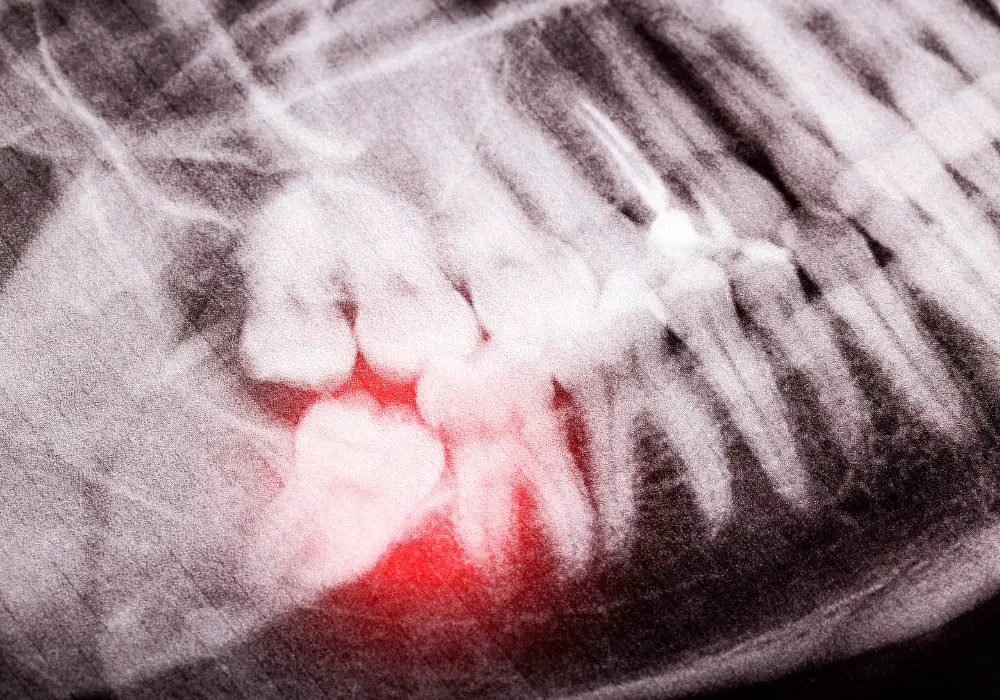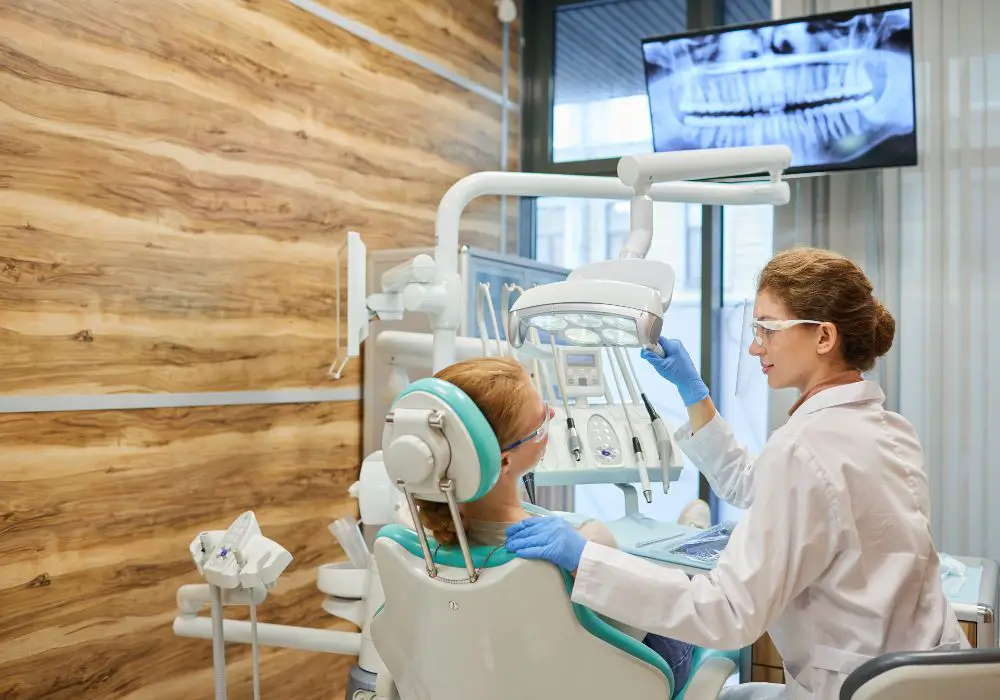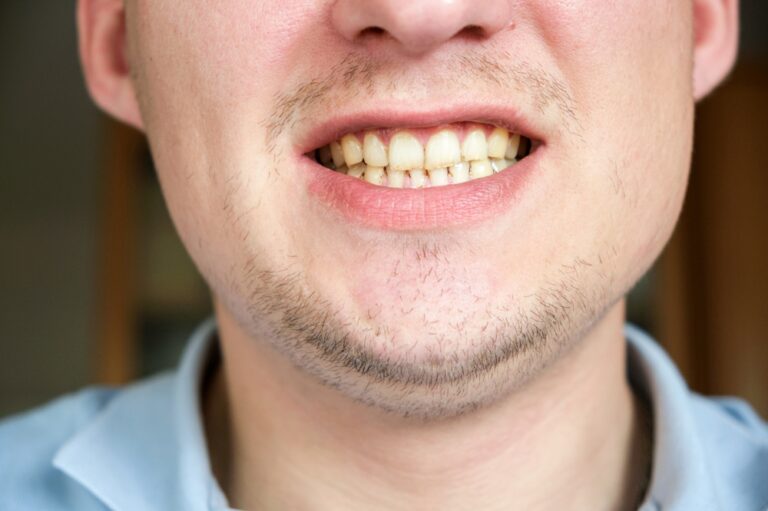What causes wisdom teeth to bleed excessively?
There are several potential causes of heavy wisdom tooth bleeding:
Pericoronitis
Pericoronitis refers to an infection in the gum flap surrounding a partially erupted wisdom tooth. As the tooth pushes through the gums, bacteria can get trapped under the tissue overlying the crown. This causes inflammation and swelling of the gums.
The inflamed gum tissue is very delicate and can bleed when anything touches or rubs against it. Bleeding is aggravated by poor oral hygiene, food impaction, and chewing on the side with the infected wisdom tooth.
Even gentle cleaning or brushing of the area can disturb the swollen gums enough to cause bleeding. Severe gum infection is also often accompanied by throbbing pain, foul odors, and unpleasant taste coming from the wisdom tooth site.
Dental Abscess
An abscess occurs when an infection develops in the tooth’s inner pulp tissue, often after tooth decay penetrates through enamel and dentin. Abscesses primarily affect wisdom teeth that are partially erupted or impacted.
The infected pulp tissue swells and bleeds easily. As the pressure builds up inside the tooth, the pus can drain into the gums through tiny openings or cracks in enamel. This produces sudden bleeding when chewing or biting down.
The pain is intense, throbbing, and worsened by hot or cold temperatures. Bleeding, foul tastes, and halitosis are common as the infection drains and decomposes tissue. In severe cases, it may spread causing facial swelling and fever.
Damage During Tooth Eruption
Wisdom teeth sometimes start to emerge through the gums but then stop short of fully erupting into the mouth. The partially exposed crown and surrounding gum tissue are very vulnerable to irritation and bacteria.
Food and debris easily become trapped around the incompletely erupted tooth. Forceful chewing movements or aggressive tooth brushing can then damage the tender gum flap, causing it to bleed profusely. It may bleed whenever something knocks against or puts pressure on the gum tissue.
Impaction
Impacted wisdom teeth are those trapped below the gums and other teeth. They fail to erupt properly due to lack of space, developing at odd angles, or running into other teeth. Impaction also allows infectious bacteria to flourish around the buried wisdom tooth.
Attempts to extract an impacted wisdom tooth can disturb the adjacent gum and bone tissue. This often causes bleeding as the tooth is surgically detached from the tissues entrapping it. There may be extensive bleeding as stitches are placed after extraction.
Healing is also much slower, so bleeding episodes can continue long after surgery whenever food, tongue, or cheeks bump the extraction site. Dry socket is another common complication causing delayed bleeding.
Clotting Disorders
Some individuals suffer from impaired blood clotting that makes it very difficult to stop bleeding anywhere in the mouth. This includes wisdom tooth sites.
Examples of clotting disorders include hemophilia, von Willebrand disease, advanced liver disease, vitamin K deficiency, or anti-clotting medications like Warfarin or Heparin. Patients with any of these conditions require special care before and after dental procedures to minimize bleeding risks.
Even a minor injury or irritation around a wisdom tooth can trigger extensive bleeding if a clotting disorder is present. Any bleeding is prolonged, difficult to control, and likely to recur.
Why is the bleeding so profuse?

There are several reasons why the bleeding from wisdom teeth seems especially heavy and rapid compared to cuts or injuries elsewhere on the body:
High Blood Flow – The mouth and gums are among the most vascular parts of the body, with a rich blood supply flowing through the tissue. Any breach to the gum surface will bleed profusely.
Inability to Clot – Saliva contains enzymes that break down clots and hinder clotting. Constant pooling of saliva around the wisdom tooth makes it hard for stable clots to form.
Aggravation – The mouth is in constant motion, so chewing, tongue motions, speech, and swallowing repeatedly aggravate any wisdom tooth wound and disrupt clotting.
Infection – Bacterial infection damages tissue, prevents healing, and causes bleeding from friable gum tissue around the wisdom tooth.
Anti-Clotting Meds – Medications like blood thinners and NSAIDs interfere with the body’s clotting mechanisms and promote dental bleeding.
Underlying Disorder – Bleeding disorders affect the ability to form solid clots. Any wisdom tooth irritation causes bleeding that is rapid, heavy, and prolonged.
Signs it is time to seek professional dental treatment

Seeking prompt professional help for wisdom tooth bleeding can prevent complications. Here are some warning signs that indicate the need for urgent dental care:
- Bleeding that lasts longer than 12 hours after extraction
- Repeatedly having to replace saturated gauze or tea bags
- Passing large blood clots from the wisdom tooth socket
- Bleeding that seems heavy and excessive for situation
- Bleeding not controlled by at-home remedies
- Fever, chills, or severe facial swelling along with bleeding
- Feeling lightheaded or weakened due to blood loss
At the first signs of any of the above, contact your dentist right away. Be prepared to describe all your symptoms in detail. Follow any instructions for controlling the bleeding until you can be evaluated.
Severe active bleeding, especially after extraction, may require going to an emergency clinic if your dentist is not available. But otherwise call your regular dentist, even after hours, so they can advise the best course of action based on your history.
When bleeding becomes dangerous
While some wisdom tooth bleeding is to be expected, uncontrolled or heavy bleeding poses serious risks like:
Infection – Bleeding provides an entry point for bacteria to invade tissue and spread infection.
Cyst Formation – Bleeding into tissues can form a blood-filled cyst called a hemangioma.
Airway Obstruction – Bleeding into the throat can block breathing, especially when lying down.
Hypovolemic Shock – Excessive blood loss can deprive the body of adequate circulation.
Anemia – Prolonged bleeding depletes iron levels and causes anemia.
Dry Socket – Dislodged clots lead to exposed bone and severe pain called dry socket.
Bone Damage – Bleeding can erode underlying bone structures like the jaw.
Necrosis – Lack of blood flow from clotting can cause tissue death and necrosis.
Air Embolism – Blood vessels damaged during extraction may allow air to enter circulation.
The potential complications demonstrate the importance of seeking prompt professional treatment for any wisdom tooth bleeding that seems abnormal. Do not wait for the bleeding to stop on its own.
Conclusion
In summary, wisdom tooth bleeding has many causes ranging from eruption issues and infection to trauma and underlying disorders. While some minor oozing can happen with new wisdom teeth, heavy or prolonged bleeding is not normal. There are ways to minimize bleeding at home, but worsening symptoms or bleeding unresponsive to self-care requires immediate dentist evaluation. Addressing the underlying cause of wisdom tooth bleeding promptly is crucial for avoiding potentially serious complications. With proper treatment, wisdom tooth sites should heal normally without complications.







